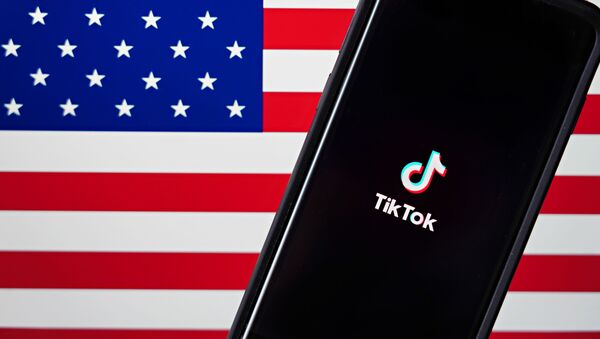Chinese social media platform TikTok has come under the crosshairs of US president Donald Trump, who threatened to ban the app from the US by 15 September if it failed to sell its US operations to a domestic firm such as Microsoft or others.
Sourabh Gupta, senior policy specialist on Asia-Pacific international relations for the Institute for China-American Studies, Fernando Bruccoleri, a tech entrepreneur from Uruguay and Jeffrey J Blatt, X-Ventures founder and Silicon Valley tech lawyer explained the potential challenges and results of a future TikTok acquisition by Microsoft.
Not 'Terribly Surprised' By Trump Administration Strong-Arming of TikTok - Policy Specialist
There was a noticeable "pattern" in reprisals or divestments forced on Chinese tech firms by Washington, Mr Gupta told Sputnik.
Chinese firms most at risk were telecoms, which were "essential" to foundations for commercial activity, data companies with cross-border flows of information raising "red flags" as well as markets not "reciprocally open" in China to US firms and content, he said.
But TikTok would was "not the end of the story" as WeChat and other platforms could follow despite not being big players in the US market, and profitability in the Microsoft talks would depend on "what Microsoft makes out of it", he added.
"It will effectively be purchasing a market innovator and leader in this youth-focused video-sharing niche, which is as yet a relatively small revenue earner. However, with the exception of its Xbox gaming business, Microsoft hasn’t really prioritized youth-facing business ventures. So much will depend on how Microsoft ultimately integrates and leverages TikTok’s U.S. user base within its broader business strategy," he explained.
Microsoft has prioritised corporate "customer-focused" business and was late in entering the videoconferencing market, adding: "So, one must be cautious in ascribing great things to Microsoft, now that it might have TikTok within its fold."
TikTok's platform was based on user-content from a domestic and international audience, and decoupling it would force the US wing to "stand or fall" on content generated by domestic users and market share from abroad, he said.
But ByteDance's "first-mover advantage" would pose a "tall challenge" to Microsoft as the US branch expanded abroad as the global internet was splintering, with Five Eyes countries and India potentially trusting Microsoft's TikTok to China's.
"At minimum, there will have to be a certain degree of algorithmic de-wiring between the app that Microsoft owns and operates in the U.S. and in perhaps certain other foreign markets such as Five Eyes countries as well as the app the parent Chinese company owns and operates in China and most other foreign market," Mr Gupta said.
Such a process would pose a "complicated logistical back-office process" but was possible, he said, adding that users should note effects of Apple and Google dropping TikTok from their app stores.
US Intervention In TikTok Sale To Microsoft Could Allow Washington Further "Specific Actions" - Entrepreneur
The ongoing US trade war with China was "no doubt" based on the US accessing and controlling data from the platform, Fernando Bruccoleri said.
Microsoft intended to ensure private data from US audiences was transferred and kept in the US, he explained.
"State intervention in conjunction with Microsoft surely has many points in common, beyond commercial and security interests," he explained.
"Not surprisingly, Donald Trump added Monday afternoon that it would be much easier if Microsoft bought 100 percent of TikTok instead of only 30 percent and even Trump wants to get a commission for the sale," Mr Bruccoleri told Sputnik.
He added that the US would not only control user data in the country, but may intervene with "specific actions" in other countries using the Microsoft app. "That will ultimately be a round business," he concluded.
TikTok Restructuring In US Possible To "Satisfy" Trump Administration Concerns - Tech Lawyer and Founder
But the post-transaction structure of TikTok's US branch would determine its profitability, Mr Blatt said, adding that Washington's efforts to ban the Chinese app were based on concerns that user data could be "accessed directly or indirectly by the Chinese government", also applying to similar applications such as WeChat.
"The proposed purchase of Tiktok’s US and possibly Australian, Canadian and other Western operations by Microsoft could obviate the concerns if properly structured. For example, separate back end operations and data handling arrangements could be structured such that all of user data in the geographic regions would be under the sole and exclusive control of Microsoft. If properly done, the US government would likely find this structure acceptable," he explained.
But there were many details in such a restructuring in "data handling, control, application updates [and] further development as well as data accountability", he added.
He explained that it was possible to structure a transaction for Microsoft to buy TikTok in the US and other closely linked Western countries to satisfy US government concerns.
"Whether or not the application would be profitable for Microsoft is an unknown, however, Microsoft would be well positioned to integrate [TikTok] into its consumer product line and potentially be competitive with Facebook and its various related companies operating in similar consumer spaces," he concluded.

